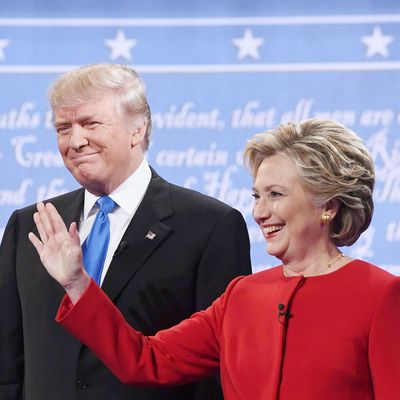
On the morning after the first presidential debate of the 2016 general election, the consensus is that Hillary Clinton’s performance so completely outclassed Donald Trump’s that you’d expect some movement in the polls in her favor when it’s all digested.
But, as Nate Cohn observed, there are no guarantees of a Clinton debate bounce:
Will the result change the race? There’s no way to be sure of how the polls will turn next. But the record of post-debate polling suggests that a victory might not matter quite as much as you might think. In general, the debates don’t have a huge effect on the polls. Historically, the polls that follow the first presidential debate have differed from the pre-debate polls by an average of just 2.5 points. The biggest shift? Only four points.
That four-point shift occurred just four years ago, when Mitt Romney “won” the first presidential debate and erased Barack Obama’s lead in the horse-race polls. His bounce obviously did not last and, as Cohn notes, may have been a bit artificial in the first place because the debate occurred soon after the Democratic National Convention, which gave the incumbent his own temporary bounce. There’s also a theory that challengers to the incumbent party are more likely to get a debate bounce if they do well, because they are less-known. This year’s Democratic and Republican candidates are both as well-known as any pair in history; they are pop-culture figures as much as they are politicians.
What we don’t know now is whether truly undecided voters were tuned in either to the debate or to all of the chatter about it. As for the partisans most likely to watch debates, many of them saw what they wanted to see (an example of what is known as “confirmation bias”).
Public Policy Polling conducted a snap poll of debate-watchers last night that showed confirmation bias in action. Overall, their sample thought Clinton “won” the debate by a 51-40 margin, a significantly narrower margin than CNN’s snap poll reported (a 62-27 Clinton “win”) immediately after the debate. But Republicans thought (or at least said they thought) Trump won by a 69-20 margin. And for that matter, white people thought Trump won by a 47-45 margin.
I don’t know what those white people saw during the debate that this white person missed. But they probably are not going to be pulled in Hillary Clinton’s direction by a debate they thought Donald Trump actually won. An identical 58 percent of Republicans said the debate made them less likely to vote for Clinton and more likely to vote for Trump, which pretty much indicates that every moment of exposure to the two candidates, regardless of what happens, intensifies their original attachment. Keep that in mind if we discover in a few days that the rout we saw on television from Hofstra is not the game-changer we imagined.






























